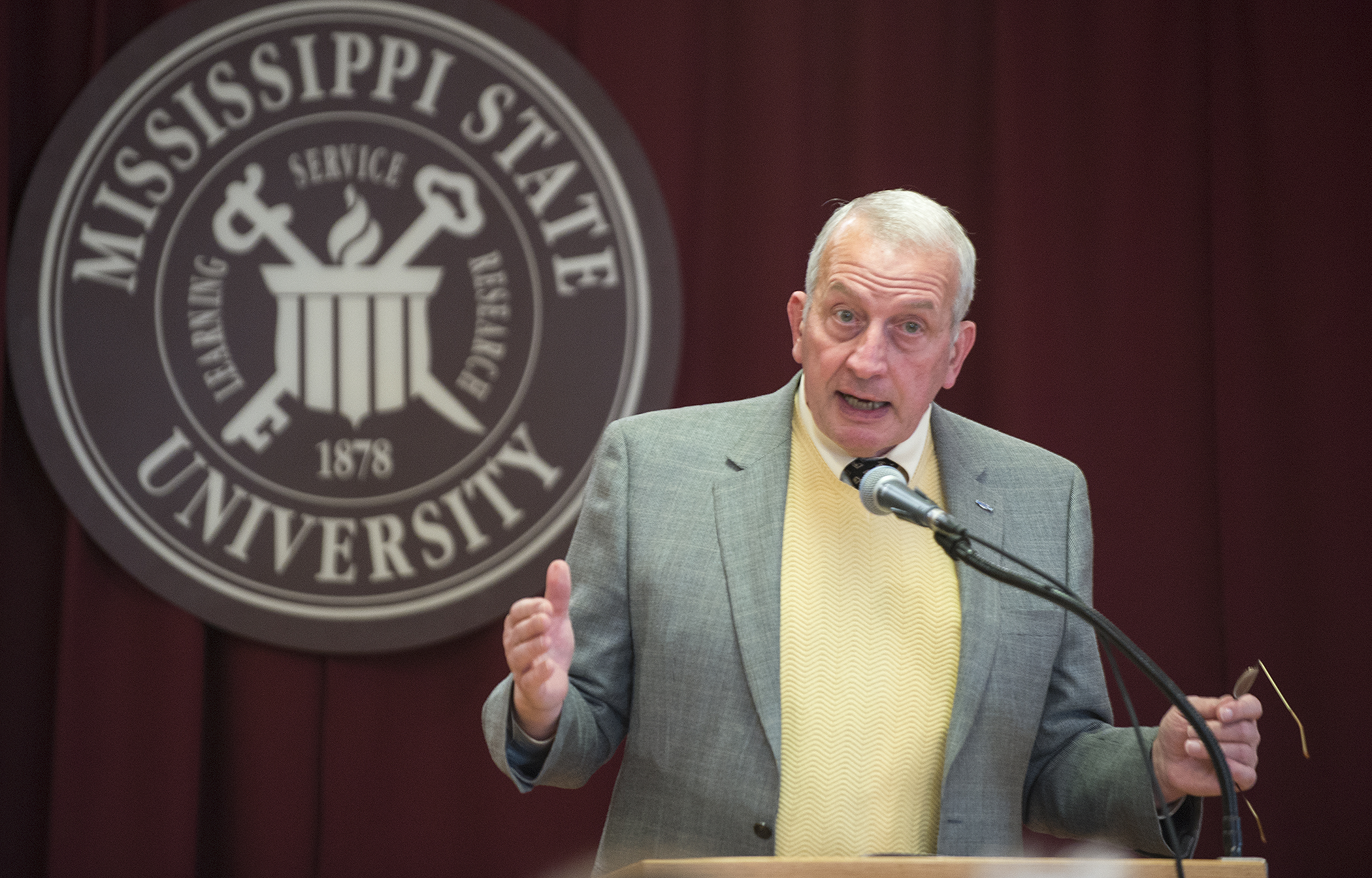Contact: Leah Barbour

Photo by: Russ Houston
STARKVILLE, Miss.--The story of Abraham Lincoln's and Ulysses S. Grant's leadership in the face of dissent is just as relevant in modern times as it was 150 years ago.
Civil War historian and author Frank J. Williams discussed the presidents' governing styles at Thursday's installment of Mississippi State University's Morris W. H. "Bill" Collins Speaker Series.
When Lincoln and Grant pushed states to grant equal rights to all citizens, they faced opposition, Williams said. Still, they embraced a vision of America where people, through hard work and service, can create better lives for themselves and thereby make the United States the greatest country in the world.
Williams emphasized unity, equality, justice and freedom as the ideals on which both Lincoln and Grant based their policies.
Those qualities spurred President Lincoln to action when he issued the Emancipation Proclamation in 1863 and when he pushed for the 1865 passage of the 13th Amendment to formally abolish slavery, Williams said.
Those same values impelled President Ulysses S. Grant to advocate the 1869 ratification of the 15th Amendment to prohibit states from denying the right to vote based on race or color, according to Williams.
Students, faculty and staff gathered to listen to Williams, a Rhode Island native, who, in addition to publishing several Civil War studies, was a longtime jurist in the Rhode Island court system and chief justice of the Rhode Island Supreme Court. Now retired, he continues to chair the Lincoln Forum and is president of the Ulysses S. Grant Association.
Williams, named the 2007 Jurist of the Year by the Pre-Law Society of MSU, presented "Two Heroes Then & Now: Abraham Lincoln & Ulysses S. Grant" to the MSU crowd. He said speaking at the university is fitting because MSU Libraries houses the Ulysses S. Grant Presidential Library.
Williams emphasized that MSU is the perfect place and has the resources to maintain Grant's historical documents, and modern lessons can be derived from Grant's example, as well as Lincoln's.
"Grant and Lincoln both fall within a certain category of unlikely heroes," Williams said. "They viewed every action as an opportunity, rather than a defeat. The status quo would not do."
He explained how Lincoln's and Grant's ability to face challenges even when their positions were unpopular is the same example of heroism that Americans young and old should embrace.
"When we think of the hero, we think of the Every Man, the ordinary person who is called upon to do extraordinary things," Williams said. "We think of a person whose spirit rises above adversity in the name of justice and right. We think of the person who not only strives for social change -- and people resist change as we all know -- but (who) also seeks to inspire people to accept change.
"Abraham Lincoln, a self-educated prairie boy who picked himself up by the bootstraps and made an enduring name for himself, is just such a person."
Williams encouraged attendees, especially the MSU students, to embrace the right to rise, by benefitting from their own hard work and becoming the next generation of leaders. He asked the crowd, what are their plans to make America the single greatest nation in the history of humanity?
"For our republic to prosper, it needs your commitment, your political courage and the fire that burns in your belly, and if, like Lincoln and Grant, you make mistakes, which all of us do, there is, in this great nation, redemption and forgiveness," he said. "The possibility of failure should never deter you, for you will lose out on the sweetest part of this dream."
That dream is to reap the advantages of industriousness and productivity, and it only becomes a reality when people have an equal chance to achieve.
"The idea is synonymous with the idea of America, that all men are created equal," he said.
Williams's visit was sponsored by MSU Libraries Congressional & Political Research Center, John C. Stennis Institute of Government, Stennis Center for Public Service and Stennis Montgomery Association.
To learn more about the Collins Speaker Series, visit http://library.msstate.edu/collins#.